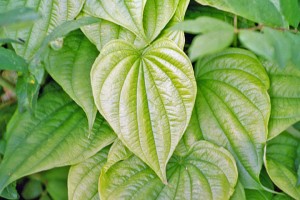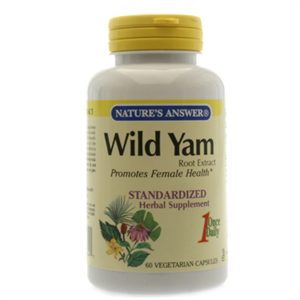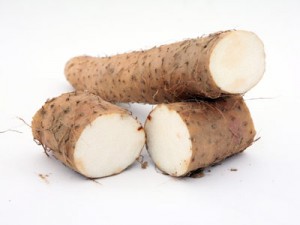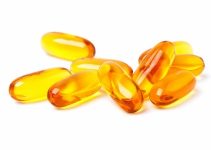What is Wild Yam?
Page Contents
Wild Yam (Dioscorea villosa) is a plant used widely as an herbal supplement to treat menstrual cramps, nausea, hot flashes and morning sickness. The root and bulb of the plant supposedly contain diosgenin which is a chemical compound that mimics human hormones and is used for making various steroids, such as progesterone and ehydroepiandrosterone (DHEA). But consuming diosgenin in its natural state may not be effective as the human body cannot transform the same into progesterone; the process can only be conducted in a laboratory. [1]
Traditionally, the plant has been used to treat rheumatic conditions, gall bladder complaints, inflammation, colic, testosterone related imbalances in men and a wide range of other disorders. Some herbalists also suggest its use as a natural contraceptive (for birth control) though there is no scientific evidence to substantiate the same.
Wild yam grows in the form of a tuberous vine and has more than 600 species of which only 12 known varieties are consumable. Some of the more commonly found species that might contain diosgenin are Chinese yam, Mexican wild yam, American yam, Atlantic yam, China root, Mexican Yam, Wild Mexican Yam.
Available forms of wild yam extracts
Tinctures and oil
Standardized extracts of tinctures and oil are considered to provide a more reliable dosage. However, certain liquid preparations of the product might contain sugar/alcohol; people suffering from diabetes, alcohol dependence and liver disease are advised to exercise necessary caution in its consumption. [2]
Pills and capsules
It is generally advised that solid formulations like pills and capsules be taken with a glass of water.
Wild yam cream
Wild yam supplements are also available in the form of cream, ointment, lotions and gel.
Estrogen and progesterone creams are known to be readily absorbed by the skin. If wild yam supplements contain similar compounds then they too might be more beneficial in the form of a cream. [3]
Several wild yam progesterone creams are falsely promoted of being “natural” and often suspected to contain synthetic versions of the hormone. Such over- the- counter creams can cause side effects like chemical toxicity and hormonal imbalances. [4]
Wild yam root
Certain powdered forms of the herb, like dried roots, can also be made into tea.
Other: The Chinese yam can be baked with flour or used fresh (as a juice).
Note: Some wild yam products (Wild yam Complex) contain a combination of herbs to enhance its effectiveness. Popular combinations often involve other supplementary herbs like Black Cohosh, St. John Wort and Chaste tree. It is essential to check the product ingredients carefully before consumption.
Dosage
Due to lack scientific information the right dosage for Wild yam supplements cannot be ascertained. An appropriate dose would depend upon several factors like health, age and severity of condition. Consult your physician or pharmacist to determine a suitable dosage. Also different formulations of the herb should not be used simultaneously to avoid the risk of an overdose.
Overdose
Symptoms of an overdose are not well known but might include:
- Nausea
- Vomiting
- Diarrhea
In case of a suspected overdose contact your doctor immediately.
Wild yam benefits
Possibly ineffective for:
Menopause related night sweats and hot flashes. Among popular treatments, wild yam extracts are applied topically in the form of a cream by women afflicted with menopausal symptoms. A 3 month study [5] has revealed that the treatment is free from side effects. But it had very little effect to alleviate the symptoms among the test subjects.
Insufficient evidence for:
- Osteoporosis
- Gallbladder problems
- Cholesterol management [6]
- Use as a natural alternative to estrogens [7]
- PMS (Premenstrual Syndrome)
- Postmenopausal vaginal dryness
- Rheumatoid arthritis
- Infertility
- Colic (Intestinal Spasms)
- Bronchitis
- Enhancing libido
- Energy boosting effects
- Breast growth [8]
- Reduction in wrinkles
- Acne
Wild yam supplements: side effects and safety concerns
For most adults, wild yam is considered to be POSSIBLY SAFE.
Pregnancy and Breast feeding: Pregnant women along with nursing mothers should try and avoid the use of wild yam.
Kidney problems: Wild yam can be potentially toxic. It should be avoided by people with a compromised kidney function. [9]
Due to lack of conclusive evidence it can be assumed that the herb might possess estrogenic properties which can have harmful effects on certain condition specific individuals.
Hormone sensitive condition: Women with a personal or family history of breast cancer [10], uterine cancer, ovarian cancer, endometriosis or uterine fibroids should consult their doctor before using any wild yam supplements.
Protein S deficiency: People suffering from Protein S deficiency are at a higher risk of clot formation. A case report [11] suggests that wild yam supplements may adversely affect such people and further increase their risk of clot formation.
Allergy: Allergic reaction to wild yam can also occur in some people. Symptoms of an allergic reaction include: [4]
- Swelling
- Hives
- Strained breathing
- Closing of the throat
This is not an exhaustive list of all possible side-effects. There can be other less severe symptoms that might go unreported. In any case consult a doctor and seek medical advice about any persisting side effect.
Drug interactions
People on any form of medication should consider using wild yam supplements only under the supervision of a licensed healthcare practitioner.
Birth control pills and Hormone replacement therapy: An animal study has revealed that diosgenin in wild yams might interact with estradiol; a naturally occurring component used in certain birth control pills and hormone replacement therapies. [12]




